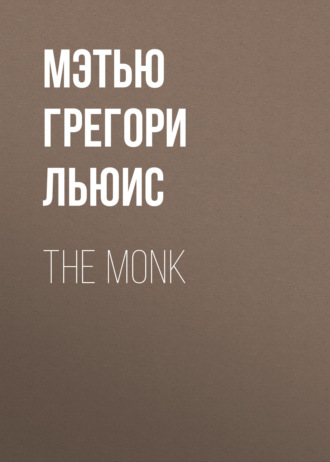 полная версия
полная версияThe Monk
'Release me! I will not hear you. Where is the Domina? Mother St. Agatha, where are you?'
The door of the Vestry opened, and the Prioress entered the Chapel, followed by her Nuns.
'Cruel! Cruel!' exclaimed Agnes, relinquishing her hold.
Wild and desperate, She threw herself upon the ground, beating her bosom and rending her veil in all the delirium of despair. The Nuns gazed with astonishment upon the scene before them. The Friar now presented the fatal paper to the Prioress, informed her of the manner in which he had found it, and added, that it was her business to decide, what penance the delinquent merited.
While She perused the letter, the Domina's countenance grew inflamed with passion. What! Such a crime committed in her Convent, and made known to Ambrosio, to the Idol of Madrid, to the Man whom She was most anxious to impress with the opinion of the strictness and regularity of her House! Words were inadequate to express her fury. She was silent, and darted upon the prostrate Nun looks of menace and malignity.
'Away with her to the Convent!' said She at length to some of her Attendants.
Two of the oldest Nuns now approaching Agnes, raised her forcibly from the ground, and prepared to conduct her from the Chapel.
'What!' She exclaimed suddenly shaking off their hold with distracted gestures; 'Is all hope then lost? Already do you drag me to punishment? Where are you, Raymond? Oh! save me! save me!'
Then casting upon the Abbot a frantic look, 'Hear me!' She continued; 'Man of an hard heart! Hear me, Proud, Stern, and Cruel! You could have saved me; you could have restored me to happiness and virtue, but would not! You are the destroyer of my Soul; You are my Murderer, and on you fall the curse of my death and my unborn Infant's! Insolent in your yet-unshaken virtue, you disdained the prayers of a Penitent; But God will show mercy, though you show none. And where is the merit of your boasted virtue? What temptations have you vanquished? Coward! you have fled from it, not opposed seduction. But the day of Trial will arrive! Oh! then when you yield to impetuous passions! when you feel that Man is weak, and born to err; When shuddering you look back upon your crimes, and solicit with terror the mercy of your God, Oh! in that fearful moment think upon me! Think upon your Cruelty! Think upon Agnes, and despair of pardon!'
As She uttered these last words, her strength was exhausted, and She sank inanimate upon the bosom of a Nun who stood near her. She was immediately conveyed from the Chapel, and her Companions followed her.
Ambrosio had not listened to her reproaches without emotion. A secret pang at his heart made him feel, that He had treated this Unfortunate with too great severity. He therefore detained the Prioress and ventured to pronounce some words in favour of the Delinquent.
'The violence of her despair,' said He, 'proves, that at least Vice is not become familiar to her. Perhaps by treating her with somewhat less rigour than is generally practised, and mitigating in some degree the accustomed penance....'
'Mitigate it, Father?' interrupted the Lady Prioress; 'Not I, believe me. The laws of our order are strict and severe; they have fallen into disuse of late, But the crime of Agnes shows me the necessity of their revival. I go to signify my intention to the Convent, and Agnes shall be the first to feel the rigour of those laws, which shall be obeyed to the very letter. Father, Farewell.'
Thus saying, She hastened out of the Chapel.
'I have done my duty,' said Ambrosio to himself.
Still did He not feel perfectly satisfied by this reflection. To dissipate the unpleasant ideas which this scene had excited in him, upon quitting the Chapel He descended into the Abbey Garden.
In all Madrid there was no spot more beautiful or better regulated. It was laid out with the most exquisite taste. The choicest flowers adorned it in the height of luxuriance, and though artfully arranged, seemed only planted by the hand of Nature: Fountains, springing from basons of white Marble, cooled the air with perpetual showers; and the Walls were entirely covered by Jessamine, vines, and Honeysuckles. The hour now added to the beauty of the scene. The full Moon, ranging through a blue and cloudless sky, shed upon the trees a trembling lustre, and the waters of the fountains sparkled in the silver beam: A gentle breeze breathed the fragrance of Orange-blossoms along the Alleys; and the Nightingale poured forth her melodious murmur from the shelter of an artificial wilderness. Thither the Abbot bent his steps.
In the bosom of this little Grove stood a rustic Grotto, formed in imitation of an Hermitage. The walls were constructed of roots of trees, and the interstices filled up with Moss and Ivy. Seats of Turf were placed on either side, and a natural Cascade fell from the Rock above. Buried in himself the Monk approached the spot. The universal calm had communicated itself to his bosom, and a voluptuous tranquillity spread languor through his soul.
He reached the Hermitage, and was entering to repose himself, when He stopped on perceiving it to be already occupied. Extended upon one of the Banks lay a man in a melancholy posture.
His head was supported upon his arm, and He seemed lost in mediation. The Monk drew nearer, and recognised Rosario: He watched him in silence, and entered not the Hermitage. After some minutes the Youth raised his eyes, and fixed them mournfully upon the opposite Wall.
'Yes!' said He with a deep and plaintive sigh; 'I feel all the happiness of thy situation, all the misery of my own! Happy were I, could I think like Thee! Could I look like Thee with disgust upon Mankind, could bury myself for ever in some impenetrable solitude, and forget that the world holds Beings deserving to be loved! Oh God! What a blessing would Misanthropy be to me!'
'That is a singular thought, Rosario,' said the Abbot, entering the Grotto.
'You here, reverend Father?' cried the Novice.
At the same time starting from his place in confusion, He drew his Cowl hastily over his face. Ambrosio seated himself upon the Bank, and obliged the Youth to place himself by him.
'You must not indulge this disposition to melancholy,' said He; 'What can possibly have made you view in so desirable a light, Misanthropy, of all sentiments the most hateful?'
'The perusal of these Verses, Father, which till now had escaped my observation. The Brightness of the Moonbeams permitted my reading them; and Oh! how I envy the feelings of the Writer!'
As He said this, He pointed to a marble Tablet fixed against the opposite Wall: On it were engraved the following lines.
INSCRIPTION IN AN HERMITAGEWho-e'er Thou art these lines now reading,Think not, though from the world recedingI joy my lonely days to lead in This Desart drear,That with remorse a conscience bleeding Hath led me here.No thought of guilt my bosom sowrs:Free-willed I fled from courtly bowers;For well I saw in Halls and Towers That Lust and Pride,The Arch-Fiend's dearest darkest Powers, In state preside.I saw Mankind with vice incrusted;I saw that Honour's sword was rusted;That few for aught but folly lusted;That He was still deceiv'd, who trusted In Love or Friend;And hither came with Men disgusted My life to end.In this lone Cave, in garments lowly,Alike a Foe to noisy folly,And brow-bent gloomy melancholy I wear awayMy life, and in my office holy Consume the day.Content and comfort bless me more inThis Grot, than e'er I felt before inA Palace, and with thoughts still soaring To God on high,Each night and morn with voice imploring This wish I sigh.'Let me, Oh! Lord! from life retire,Unknown each guilty worldly fire,Remorseful throb, or loose desire; And when I die,Let me in this belief expire, "To God I fly"!'Stranger, if full of youth and riotAs yet no grief has marred thy quiet,Thou haply throw'st a scornful eye at The Hermit's prayer:But if Thou hast a cause to sigh at Thy fault, or care;If Thou hast known false Love's vexation,Or hast been exil'd from thy Nation,Or guilt affrights thy contemplation, And makes thee pine,Oh! how must Thou lament thy station, And envy mine!'Were it possible' said the Friar, 'for Man to be so totally wrapped up in himself as to live in absolute seclusion from human nature, and could yet feel the contented tranquillity which these lines express, I allow that the situation would be more desirable, than to live in a world so pregnant with every vice and every folly. But this never can be the case. This inscription was merely placed here for the ornament of the Grotto, and the sentiments and the Hermit are equally imaginary. Man was born for society. However little He may be attached to the World, He never can wholly forget it, or bear to be wholly forgotten by it. Disgusted at the guilt or absurdity of Mankind, the Misanthrope flies from it: He resolves to become an Hermit, and buries himself in the Cavern of some gloomy Rock. While Hate inflames his bosom, possibly He may feel contented with his situation: But when his passions begin to cool; when Time has mellowed his sorrows, and healed those wounds which He bore with him to his solitude, think you that Content becomes his Companion? Ah! no, Rosario. No longer sustained by the violence of his passions, He feels all the monotony of his way of living, and his heart becomes the prey of Ennui and weariness. He looks round, and finds himself alone in the Universe: The love of society revives in his bosom, and He pants to return to that world which He has abandoned. Nature loses all her charms in his eyes: No one is near him to point out her beauties, or share in his admiration of her excellence and variety. Propped upon the fragment of some Rock, He gazes upon the tumbling waterfall with a vacant eye, He views without emotion the glory of the setting Sun. Slowly He returns to his Cell at Evening, for no one there is anxious for his arrival; He has no comfort in his solitary unsavoury meal: He throws himself upon his couch of Moss despondent and dissatisfied, and wakes only to pass a day as joyless, as monotonous as the former.'
'You amaze me, Father! Suppose that circumstances condemned you to solitude; Would not the duties of Religion and the consciousness of a life well spent communicate to your heart that calm which....'
'I should deceive myself, did I fancy that they could. I am convinced of the contrary, and that all my fortitude would not prevent me from yielding to melancholy and disgust. After consuming the day in study, if you knew my pleasure at meeting my Brethren in the Evening! After passing many a long hour in solitude, if I could express to you the joy which I feel at once more beholding a fellow-Creature! 'Tis in this particular that I place the principal merit of a Monastic Institution. It secludes Man from the temptations of Vice; It procures that leisure necessary for the proper service of the Supreme; It spares him the mortification of witnessing the crimes of the worldly, and yet permits him to enjoy the blessings of society. And do you, Rosario, do YOU envy an Hermit's life? Can you be thus blind to the happiness of your situation? Reflect upon it for a moment. This Abbey is become your Asylum: Your regularity, your gentleness, your talents have rendered you the object of universal esteem: You are secluded from the world which you profess to hate; yet you remain in possession of the benefits of society, and that a society composed of the most estimable of Mankind.'
'Father! Father! 'tis that which causes my Torment! Happy had it been for me, had my life been passed among the vicious and abandoned! Had I never heard pronounced the name of Virtue! 'Tis my unbounded adoration of religion; 'Tis my soul's exquisite sensibility of the beauty of fair and good, that loads me with shame! that hurries me to perdition! Oh! that I had never seen these Abbey walls!'
'How, Rosario? When we last conversed, you spoke in a different tone. Is my friendship then become of such little consequence? Had you never seen these Abbey walls, you never had seen me: Can that really be your wish?'
'Had never seen you?' repeated the Novice, starting from the Bank, and grasping the Friar's hand with a frantic air; 'You? You? Would to God, that lightning had blasted them, before you ever met my eyes! Would to God! that I were never to see you more, and could forget that I had ever seen you!'
With these words He flew hastily from the Grotto. Ambrosio remained in his former attitude, reflecting on the Youth's unaccountable behaviour. He was inclined to suspect the derangement of his senses: yet the general tenor of his conduct, the connexion of his ideas, and calmness of his demeanour till the moment of his quitting the Grotto, seemed to discountenance this conjecture. After a few minutes Rosario returned. He again seated himself upon the Bank: He reclined his cheek upon one hand, and with the other wiped away the tears which trickled from his eyes at intervals.
The Monk looked upon him with compassion, and forbore to interrupt his meditations. Both observed for some time a profound silence. The Nightingale had now taken her station upon an Orange Tree fronting the Hermitage, and poured forth a strain the most melancholy and melodious. Rosario raised his head, and listened to her with attention.
'It was thus,' said He, with a deep-drawn sigh; 'It was thus, that during the last month of her unhappy life, my Sister used to sit listening to the Nightingale. Poor Matilda! She sleeps in the Grave, and her broken heart throbs no more with passion.'
'You had a Sister?'
'You say right, that I HAD; Alas! I have one no longer. She sunk beneath the weight of her sorrows in the very spring of life.'
'What were those sorrows?'
'They will not excite YOUR pity: YOU know not the power of those irresistible, those fatal sentiments, to which her Heart was a prey. Father, She loved unfortunately. A passion for One endowed with every virtue, for a Man, Oh! rather let me say, for a divinity, proved the bane of her existence. His noble form, his spotless character, his various talents, his wisdom solid, wonderful, and glorious, might have warmed the bosom of the most insensible. My Sister saw him, and dared to love though She never dared to hope.'
'If her love was so well bestowed, what forbad her to hope the obtaining of its object?'
'Father, before He knew her, Julian had already plighted his vows to a Bride most fair, most heavenly! Yet still my Sister loved, and for the Husband's sake She doted upon the Wife. One morning She found means to escape from our Father's House: Arrayed in humble weeds She offered herself as a Domestic to the Consort of her Beloved, and was accepted. She was now continually in his presence: She strove to ingratiate herself into his favour: She succeeded. Her attentions attracted Julian's notice; The virtuous are ever grateful, and He distinguished Matilda above the rest of her Companions.'
'And did not your Parents seek for her? Did they submit tamely to their loss, nor attempt to recover their wandering Daughter?'
'Ere they could find her, She discovered herself. Her love grew too violent for concealment; Yet She wished not for Julian's person, She ambitioned but a share of his heart. In an unguarded moment She confessed her affection. What was the return? Doating upon his Wife, and believing that a look of pity bestowed upon another was a theft from what He owed to her, He drove Matilda from his presence. He forbad her ever again appearing before him. His severity broke her heart: She returned to her Father's, and in a few Months after was carried to her Grave.'
'Unhappy Girl! Surely her fate was too severe, and Julian was too cruel.'
'Do you think so, Father?' cried the Novice with vivacity; 'Do you think that He was cruel?'
'Doubtless I do, and pity her most sincerely.'
'You pity her? You pity her? Oh! Father! Father! Then pity me!'
The Friar started; when after a moment's pause Rosario added with a faltering voice,—'for my sufferings are still greater. My Sister had a Friend, a real Friend, who pitied the acuteness of her feelings, nor reproached her with her inability to repress them. I …! I have no Friend! The whole wide world cannot furnish an heart that is willing to participate in the sorrows of mine!'
As He uttered these words, He sobbed audibly. The Friar was affected. He took Rosario's hand, and pressed it with tenderness.
'You have no Friend, say you? What then am I? Why will you not confide in me, and what can you fear? My severity? Have I ever used it with you? The dignity of my habit? Rosario, I lay aside the Monk, and bid you consider me as no other than your Friend, your Father. Well may I assume that title, for never did Parent watch over a Child more fondly than I have watched over you. From the moment in which I first beheld you, I perceived sensations in my bosom till then unknown to me; I found a delight in your society which no one's else could afford; and when I witnessed the extent of your genius and information, I rejoiced as does a Father in the perfections of his Son. Then lay aside your fears; Speak to me with openness: Speak to me, Rosario, and say that you will confide in me. If my aid or my pity can alleviate your distress....'
'Yours can! Yours only can! Ah! Father, how willingly would I unveil to you my heart! How willingly would I declare the secret which bows me down with its weight! But Oh! I fear! I fear!'
'What, my Son?'
'That you should abhor me for my weakness; That the reward of my confidence should be the loss of your esteem.'
'How shall I reassure you? Reflect upon the whole of my past conduct, upon the paternal tenderness which I have ever shown you. Abhor you, Rosario? It is no longer in my power. To give up your society would be to deprive myself of the greatest pleasure of my life. Then reveal to me what afflicts you, and believe me while I solemnly swear....'
'Hold!' interrupted the Novice; 'Swear, that whatever be my secret, you will not oblige me to quit the Monastery till my Noviciate shall expire.'
'I promise it faithfully, and as I keep my vows to you, may Christ keep his to Mankind. Now then explain this mystery, and rely upon my indulgence.'
'I obey you. Know then.... Oh! how I tremble to name the word! Listen to me with pity, revered Ambrosio! Call up every latent spark of human weakness that may teach you compassion for mine! Father!' continued He throwing himself at the Friar's feet, and pressing his hand to his lips with eagerness, while agitation for a moment choaked his voice; 'Father!' continued He in faltering accents, 'I am a Woman!'
The Abbot started at this unexpected avowal. Prostrate on the ground lay the feigned Rosario, as if waiting in silence the decision of his Judge. Astonishment on the one part, apprehension on the other, for some minutes chained them in the same attitudes, as had they been touched by the Rod of some Magician. At length recovering from his confusion, the Monk quitted the Grotto, and sped with precipitation towards the Abbey. His action did not escape the Suppliant. She sprang from the ground; She hastened to follow him, overtook him, threw herself in his passage, and embraced his knees. Ambrosio strove in vain to disengage himself from her grasp.
'Do not fly me!' She cried; 'Leave me not abandoned to the impulse of despair! Listen, while I excuse my imprudence; while I acknowledge my Sister's story to be my own! I am Matilda; You are her Beloved.'
If Ambrosio's surprise was great at her first avowal, upon hearing her second it exceeded all bounds. Amazed, embarrassed, and irresolute He found himself incapable of pronouncing a syllable, and remained in silence gazing upon Matilda: This gave her opportunity to continue her explanation as follows.
'Think not, Ambrosio, that I come to rob your Bride of your affections. No, believe me: Religion alone deserves you; and far is it from Matilda's wish to draw you from the paths of virtue. What I feel for you is love, not licentiousness; I sigh to be possessor of your heart, not lust for the enjoyment of your person. Deign to listen to my vindication: A few moments will convince you that this holy retreat is not polluted by my presence, and that you may grant me your compassion without trespassing against your vows.'—She seated herself: Ambrosio, scarcely conscious of what He did, followed her example, and She proceeded in her discourse.
'I spring from a distinguished family: My Father was Chief of the noble House of Villanegas. He died while I was still an Infant, and left me sole Heiress of his immense possessions. Young and wealthy, I was sought in marriage by the noblest Youths of Madrid; But no one succeeded in gaining my affections. I had been brought up under the care of an Uncle possessed of the most solid judgment and extensive erudition. He took pleasure in communicating to me some portion of his knowledge. Under his instructions my understanding acquired more strength and justness than generally falls to the lot of my sex: The ability of my Preceptor being aided by natural curiosity, I not only made a considerable progress in sciences universally studied, but in others, revealed but to few, and lying under censure from the blindness of superstition. But while my Guardian laboured to enlarge the sphere of my knowledge, He carefully inculcated every moral precept: He relieved me from the shackles of vulgar prejudice; He pointed out the beauty of Religion; He taught me to look with adoration upon the pure and virtuous, and, woe is me! I have obeyed him but too well!
'With such dispositions, Judge whether I could observe with any other sentiment than disgust the vice, dissipation, and ignorance, which disgrace our Spanish Youth. I rejected every offer with disdain. My heart remained without a Master till chance conducted me to the Cathedral of the Capuchins. Oh! surely on that day my Guardian Angel slumbered neglectful of his charge! Then was it that I first beheld you: You supplied the Superior's place, absent from illness. You cannot but remember the lively enthusiasm which your discourse created. Oh! how I drank your words! How your eloquence seemed to steal me from myself! I scarcely dared to breathe, fearing to lose a syllable; and while you spoke, Methought a radiant glory beamed round your head, and your countenance shone with the majesty of a God. I retired from the Church, glowing with admiration. From that moment you became the idol of my heart, the never-changing object of my Meditations. I enquired respecting you. The reports which were made me of your mode of life, of your knowledge, piety, and self-denial riveted the chains imposed on me by your eloquence. I was conscious that there was no longer a void in my heart; That I had found the Man whom I had sought till then in vain. In expectation of hearing you again, every day I visited your Cathedral: You remained secluded within the Abbey walls, and I always withdrew, wretched and disappointed. The Night was more propitious to me, for then you stood before me in my dreams; You vowed to me eternal friendship; You led me through the paths of virtue, and assisted me to support the vexations of life. The Morning dispelled these pleasing visions; I woke, and found myself separated from you by Barriers which appeared insurmountable. Time seemed only to increase the strength of my passion: I grew melancholy and despondent; I fled from society, and my health declined daily. At length no longer able to exist in this state of torture, I resolved to assume the disguise in which you see me. My artifice was fortunate: I was received into the Monastery, and succeeded in gaining your esteem.
'Now then I should have felt compleatly happy, had not my quiet been disturbed by the fear of detection. The pleasure which I received from your society, was embittered by the idea that perhaps I should soon be deprived of it: and my heart throbbed so rapturously at obtaining the marks of your friendship, as to convince me that I never should survive its loss. I resolved, therefore, not to leave the discovery of my sex to chance, to confess the whole to you, and throw myself entirely on your mercy and indulgence. Ah! Ambrosio, can I have been deceived? Can you be less generous than I thought you? I will not suspect it. You will not drive a Wretch to despair; I shall still be permitted to see you, to converse with you, to adore you! Your virtues shall be my example through life; and when we expire, our bodies shall rest in the same Grave.'







